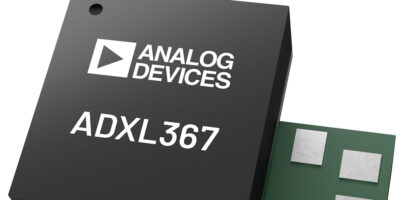ADI improves power consumption in latest MEMS accelerometer
The ADXL367, three-axis MEMS accelerometer by Analog Devices (ADI) has improved power consumption – by a factor of two – compared to the earlier ADXL362 device. It also has improved noise performance, by up to 30 per cent.
The ADXL367 accelerometer is designed for healthcare and industrial applications, including vital signs monitoring, hearing aids and motion-enabled metering devices. It also provides extended field time that maximises battery life and reduces maintenance frequency and cost.
The ADXL367 consumes just 0.88 microA at a 100Hz output data rate and 180nA when in motion-triggered wake-up mode. Power consumption in measurement mode is 970nW. Unlike accelerometers that use power duty cycling to achieve low power consumption, the ADXL367 does not alias input signals by under-sampling, explained Analog Device. Instead, it samples the full bandwidth of the sensor at all data rates.
The accelerometer has a deep multi-mode output FIFO, a built-in micropower temperature sensor, an internal ADC for synchronous conversion of an additional analogue input, single/double tap detection and state machine to prevent a false triggering.
The ADXL367 functions with supply voltages as small as 1.1V which allows for single cell battery operation without external boost converters.
The accelerometer is designed with provisions for external control of the sampling time and/or an external clock.
Digital features, such as single and double tap, free fall, and activity detection reduce computation demand for the host microprocessor to improve system power consumption.
The ADXL367, in a 2.2 x 2.3 x 0.87mm package, is in full production now.
Analog Devices has a suite of analogue and mixed signal, power management, radio frequency (RF) and digital and sensor technologies for customers in the industrial, communications, automotive, and consumer markets.




